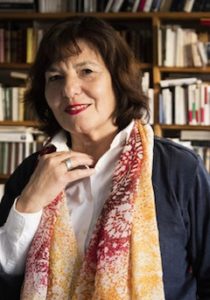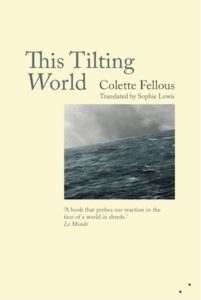Heart to heart
by Colette FellousIt’s August in Tunisia, I come across this scene. Before the wrought-iron window frame, in full sunlight, you can come and see what’s happening now as well as what has happened, you can sit and wait for the sounds to return, for the smells, the gestures, the words to revive and it’s suddenly all so close to now. With patience and care you can return to every point in time. You go closer, you stare. A woman is there before the window, I recognise her. She is holding her father in her arms, it’s strange because her father is still just a baby, his jumpsuit is baby-blue and he’s looking at her, it seems he too recognises her, she is indeed his future daughter, his only daughter: his wild one, as he will call her. And she is seeking his smile, she calls him very softly by his name, Henry, Henry, she bursts into giggles because she’s never before met a baby called Henry, she tosses her head and her hair back and talks while rocking him, tells him what has become of her and of the world since his death, in November 1982, in Paris in his black Peugeot which was almost his home, he loved it so much, this scene keeps coming back to her over and over, but she’s never in the same place, it reappears unheralded, out of the blue. She was thirty-two and he seventy-three, she cannot forget, she asks if he remembers, she says he might remember if he pays close attention, because now you can come and go in time as you like, everything is possible, even never dying is an option, the evidence, here you are, papa, and you’re just a baby, yet you’re my father and you died in November 1982, so do you remember that day, near the Quai de la Loire, do you?
He thought that if he rested for a moment it would pass, so he sat down at the wheel of his Peugeot to catch his breath, he hadn’t even time to bring his left leg into the car.”
Her father’s heart had given way, yes, quite as cruelly as Alain’s and doubtless just as her own would soon give way without warning, she shrugs awkwardly as he so often did and, echoing him, she says: that’s life, that’s how it is, it can’t be helped. That day he’d wanted to carry out the big TV and put it in the boot of his car. His son had given it to him, the one he called ‘my son the doctor’: as his son had bought a newer, less bulky model, he’d said papa, you can have the TV if you want it. Here are the keys, come and pick it up when you like. With great effort, he managed to heft it off the ground, first he got it into the lift, his lips in a tight grimace, then he had crossed the shared gardens cradling it in his arms like a baby, people don’t think of it now but they were very, very heavy, TVs back then, her dad walked like that, a little bent and very focused, all the way to the car which was parked a little further down the alley. He managed to wedge it between two cardboard boxes, then closed the boot firmly, exhausted but glad to have managed the task by himself, he wouldn’t have dared to ask for help for he never wanted to bother anyone: see, I managed, all by myself, uff. And just then, he put his hand to his heart because suddenly everything seized up, he recognised the pain, unmistakable, piercing, precisely the same as two years before, when he’d been ambulanced from Château Pierrefonds, his nursing home, straight to intensive care at the Hôpital Tenon, but in this narrow street near the Quai de la Loire on the seventh day of November in 1982, there was no one about at this hour of the afternoon. He thought that if he rested for a moment it would pass, so he sat down at the wheel of his Peugeot to catch his breath, he hadn’t even time to bring his left leg into the car, his strength gone, he died right there, in a Parisian backstreet near the Quai de la Loire, at around four in the afternoon, all alone, his car door open and one leg still on the pavement. A black Peugeot, it should be emphasised, for that car was his life, as he used to say. And in the boot, the huge, black TV, abandoned, already holding the seeds of images of today’s world, invisible still but present, even those of 13 November 2015 were hidden inside it, with the faces of the hundred and thirty lives cut short and a photo of the killers, even those of the San Bernadino shooting at an office Christmas party, even those stupid local news items like the man in Florida who jumped into a lake to escape the police and was eaten by an alligator, and the story of the mouse that caused a stampede in a Moroccan mosque. The TV accepts all images, it deals wholesale, that’s what it’s for, but now it’s fallen completely silent, in the boot of the black Peugeot, silent and withdrawn, like the heart of the man who carried it. Her father’s heart had given up. His heart which is also her own heart, she who is always at the window, in another time, at the very beginning of the twentieth century, with her baby father in her arms.
She’s wearing a white dress with a black tulle flounce that brushes her knee, a very pretty dress.
I draw closer to the window to see her better. I recognise this woman: she is me.
***
Me in this book, attempting, in piecemeal fashion, to tell the story of a father born and dead in the twentieth century, and the story of this world now, this Tunisian village I shall have to leave behind, in this year 2015, a terrifying year, remorseless, in its new, 21st-century colours. More than a hundred years later. Even if leaving tears me apart, even if leaving destroys me, I cannot do anything else; Alain’s death may have precipitated things. ‘It was his heart,’ the coroner said. The same sentence for Alain and for my father.
It’s been ten days now of Alain’s repose close to a tree in Gammarth. Jean-Claude and Sadika planted a papyrus on the grave, he used to love that little wood beside the sea. Now we must leave him in peace.
From This Tilting World, originally published in French as Pièces détachées © Éditions Gallimard, 2017
English translation © Sophie Lewis, 2019
 Colette Fellous is the author of more than twenty novels, including Aujourd’hui (2005), for which she received the Prix Marguerite Duras, and La préparation de la vie (2014), in which she pays homage to her mentor Roland Barthes. An interviewer and radio producer for France Culture for 30 years, she is now editorial director of the collection ‘Traits et portraits’ at Éditions Mercure de France. She is also a photographer, and lives between France and Tunisia, where she was born. This Tilting World, translated by Sophie Lewis, is published in paperback by Les Fugitives.
Colette Fellous is the author of more than twenty novels, including Aujourd’hui (2005), for which she received the Prix Marguerite Duras, and La préparation de la vie (2014), in which she pays homage to her mentor Roland Barthes. An interviewer and radio producer for France Culture for 30 years, she is now editorial director of the collection ‘Traits et portraits’ at Éditions Mercure de France. She is also a photographer, and lives between France and Tunisia, where she was born. This Tilting World, translated by Sophie Lewis, is published in paperback by Les Fugitives.
Read more
@LesFugitives
Author portrait © Catherine Hélie
Sophie Lewis translates from French and Portuguese. Her translation of Emilie de Turckheim’s Héloïse is Bald (Jonathan Cape) received the Scott Moncrieff Prize commendation, and her translation of Noémi Lefebvre’s Blue Self-Portrait (Les Fugitives) was shortlisted for the Scott Moncrieff and Republic of Consciousness prizes. She is the managing editor at the Folio Society and a co-founder of Shadow Heroes, a translation workshop series.
@sophietimes


